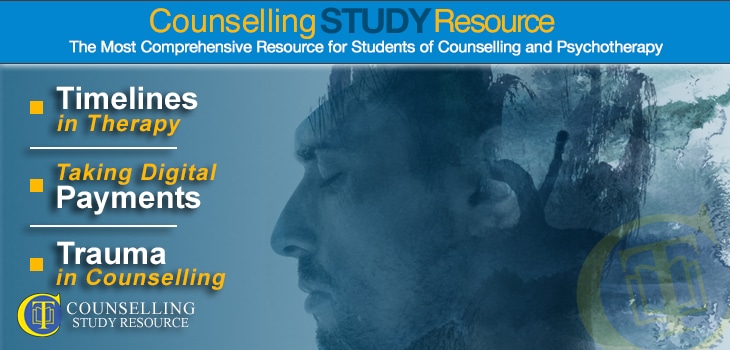172 - Working with Trauma in Counselling
Timelines in Therapy - Taking Digital Payments
In episode 172 of the Counselling Tutor Podcast, Rory Lees-Oakes and Ken Kelly start with the 'Student Check-In', in which they discuss the use of timelines in therapy. Then, in the 'Digital Counselling Revolution', they give some pointers to taking payments digitally.
Finally, 'Practice Matters' focuses on working with trauma in counselling, through an interview with Tracy Jarvis, a psychotherapist who specialises in trauma, stress and neuroscience. Tracy is also Director of PESI UK.
Timelines in Therapy (starts at 1.40 mins)
Ken and Rory discuss this interesting topic, which crops up on our Facebook group: if you are not already a member, do come along and join this community, where you can talk counselling with over 34,000 others interested in this field - students, qualified practitioners, supervisors and tutors.
Rory notes that Danish philosopher Søren Kierkegaard, whose work Carl Rogers drew on, said: 'Life can only be understood backwards; but it must be lived forwards.'
Timelines are a way of helping clients to understand how they got to where they are, making sense of their past experiences.
Ken and Rory describe how to create a timeline exercise and to use this with clients, advising too to avoid this exercise with clients who have experienced difficult trauma.
Rory has written a handout on using timelines in therapy, which you can download here.
Taking Digital Payments (starts at 11.48 mins)
Taking payment for online and telephone counselling has to be done digitally, of course. And even for face-to-face sessions, digital payments are becoming increasingly popular.
This method of taking payment can improve the flow of the session through allowing payment in advance, so avoiding adding a financial transaction to the end of the session after the client has been talking about emotional material.
Two key issues to bear in mind when taking digital payments are confidentiality and security. These apply to both parties.
If you don't use a separate business account for your private practice, for example, you would not want your clients' names to show on the bank records from a shared account. Similarly, a client may not want their partner to be aware that they are having counselling.
Ken provides a couple of examples of digital payment methods that can be used confidentially and securely, explaining how these work.
If you would like to know more about taking payments digitally, you could search online using the keywords 'payment gateways', which is the generic term used to describe such facilities.
You might also like to consider taking our course, Online and Telephone Counselling, which covers this topic in greater depth.
Working with Trauma in Counselling (starts at 21.35 mins)
Rory speaks to Tracy Jarvis about:
- what trauma is and is not
- how trauma can be defined
- the link between trauma and bodily responses to events
- the difference between relational trauma and emotional wounding/injury
- how to spot/identify possible trauma in counselling assessment
- how to take a holistic approach to assessing possible trauma
- the importance of personal development and self-awareness when working with trauma in counselling
We hope that Tracy will be recording lectures related to working with trauma in counselling in future for Counsellor CPD.


